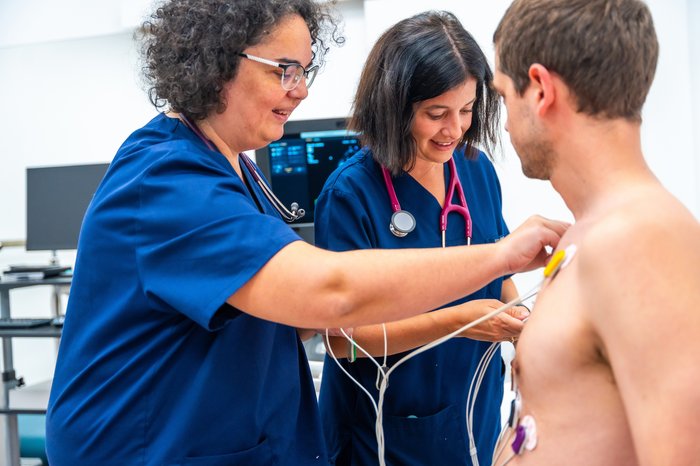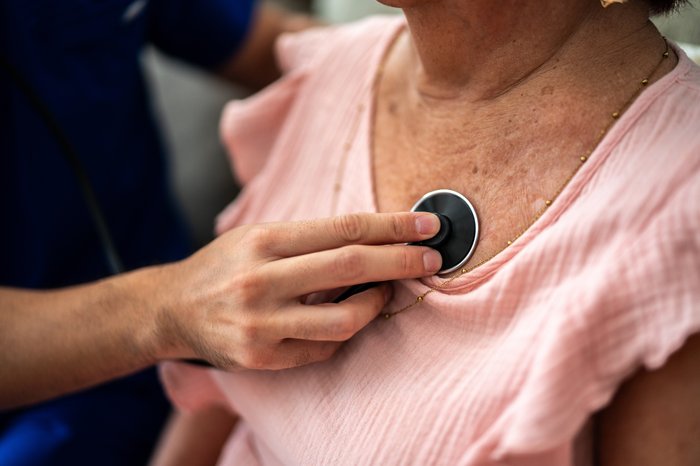Your body contains a complex network of blood vessels that carry blood between your organs.
Arteries carry blood from your heart to the rest of your body and veins carry blood from your body back to your heart.
This network of blood vessels is called your circulatory system.
Your heart is the centre of this system. If your heart doesn’t work as well as it should, it can affect your other organs. This leaflet explains how heart disease can affect the kidneys.
What does your heart do?
Your heart is a muscle, and it has the vital job of pumping blood around your body. Blood provides oxygen and other important nutrients to your organs. All of your organs need a continuous supply of oxygen and nutrients to stay healthy.
The heart also carries away carbon dioxide and waste products from your organs.

How does my heart work normally?
Your heart is divided into four chambers.
The right side of your heart pumps blood into your lungs where it picks up oxygen.
The left side of your heart receives this oxygen-rich blood from your lungs and pumps it to your organs.
Your heart has to pump enough blood through your circulatory system all the time. It does this by:
- Keeping your heartbeat regular through an electrical system within the heart which controls the timing of the pump.
- Keeping your heart muscle pumping blood and relaxing between heartbeats.
- Keeping blood flowing through the heart through special valves which control the flow in and out of the chambers of the heart.
Blood pressure is the measure of the force that pumps your blood around your body.
What is heart disease?
Heart disease describes a range of conditions that affect the heart or blood vessels. This can include:
- Problems with the heart’s electrical system. This can lead to an arrhythmia where the heart chambers beat too fast, too slowly or in an uncoordinated way.
- Problems with the heart’s pump, which is called heart failure. These problems can be either when the heart contracts, so the force is not as strong, or when it relaxes between heart beats, when the muscle is too stiff.
- Lack of blood supply to the heart muscle is called ischaemia and is usually caused by atherosclerosis — a ‘furring up’ of the arteries. This can lead to chest pain (angina) or even a heart attack (myocardial infarction).
- Problems with the heart valves. This disrupts the normal flow of the blood.
How can heart disease affect kidney disease?
Your heart pumps oxygen and nutrients to all the organs in your body. Your kidneys need oxygen to function normally. If your heart is not working properly, the oxygen flow to the kidneys is reduced. This will cause your kidney function to get worse over time.
How can kidney disease affect the heart?
- When the blood supply to the kidneys is reduced, the hormone system which helps to maintain a good blood pressure is affected. This causes a higher pressure in the arteries which affects the function of the heart.
- Changes in cholesterol levels in some kidney conditions can also damage the heart.
- Increased fluid retention can increase the pressure on the heart.
- Medications for treating some kidney conditions, such as steroid therapy, increase the chance of having heart disease.
As the relationship between your heart and kidneys is so important, your doctor may check your heart if you have a kidney condition, and check your kidneys if you have a heart condition.

What increases the chances of heart disease?
There are lots of factors that can increase your risk of developing heart disease, including:
- Age: Older people are more at risk of heart disease, although it can affect people of all ages
- Sex: Men are more likely to have heart disease at a younger age than women
- Smoking
- High alcohol intake
- Menopause: The risk of heart disease increases after menopause
- High blood pressure which is not treated effectively
- Family history of heart disease
- Food choices: A diet that is high in processed foods and meats, salt, sugar and fat is bad for your health
- Diabetes
- An inactive lifestyle with minimal physical activity
What are the symptoms of heart disease?
The symptoms of heart disease can vary depending on the underlying cause. Symptoms can develop very quickly over just a few days or more slowly over several weeks or months.
Many of the symptoms of heart disease can also be caused by other conditions and may not be serious. However, you should always talk to your doctor if you are concerned, especially if the symptoms develop quickly.
Symptoms of heart disease include:
- Chest pain. This usually occurs in the centre of the chest, moving down the left arm or up to the neck. It can come on suddenly or can be noticed when you are trying to walk, climb stairs or exercise. The pain may vary and can be felt differently by men and women and by people with diabetes. Seek immediate medical help if you have chest pain
- Breathlessness. This may be worse when exercising but can occur even when you are resting
- Changes in the heart rate so it feels unusually fast, slow or fluttering (irregular)
- Feeling more tired than usual
- Feeling very weak
- Frequent coughing with white or pink phlegm (mucus)
- Swollen ankles, legs or abdomen due to retaining fluid

How is heart disease diagnosed?
Your doctor may do some tests to see how your heart is working.
These may include:
- Blood tests: to check both your kidney function and cholesterol levels. You may also have a blood test for N-terminal-pro hormone BNP (NT-proBNP), a hormone that is released by the heart in response to changes in pressure. High levels of this hormone can be a sign of heart failure
- An electrocardiogram (ECG): patches are stuck onto your skin to record your heart’s rhythm and electrical activity
- An echocardiogram: a scan that uses sound waves to check your heart’s structure and function
- An X-ray: this is a test that produces a picture of your heart and lungs
How is heart disease treated?
If you are diagnosed with heart disease you will be seen by a specialist heart (cardiac) team in a hospital. Although the damage to your heart may not be able to be reversed, there are treatments that can help manage your symptoms.
Lifestyle changes
These include:
- Giving up smoking. Your GP can help you with this
- Giving up or cutting down on your alcohol intake
- Eating a high fibre, low salt diet, with more fruit and vegetables and fewer animal products. This can support both your heart and kidney health
- Staying active and moving more. This can be a simple as increasing the amount of walking that you do each day. Doing any amount of physical activity is better than none. Your GP can give you advice about how to exercise safely.
These changes can help with your symptoms and reduce the risk of your heart disease getting worse.
Medicines
You may be prescribed several different medicines, including:
- Angiotensin-converting enzyme (ACE) inhibitors, Angiotensin receptor blockers (ARBs) or Angiotensin receptor neprillysin inhibitors (ARNI) to help relax and open your blood vessels and reduce your blood pressure
- Mineralocorticoid receptor antagonists (MRAs) to lower your blood pressure and reduce some of the fluid around your heart
- Diuretics (water tablets) to help you pass more urine and reduce ankle swelling and breathlessness
- Beta blockers which regulate the heartbeat to make sure it is not too fast. This helps reduce the work of the heart
- Sodium Glucose Co-transporter-2 (SGLT2) inhibitors to reduce blood pressure, lower the risk of developing heart failure and slow the progression of kidney disease.
You may need regular blood tests while taking these medicines.

Other treatment
If you have severe heart disease, your doctor may discuss further treatment options.
These could include:
- A coronary angiogram. This a special X-ray to look at the blood supply to the heart to see if there are any narrowed blood vessels that can be treated. This may be by an angioplasty where a tiny tube called a stent is inserted into the artery to keep it open
- Device implants. If you have an abnormal heart beat, or a certain type of heart failure, your cardiac team may suggest that you have a small device placed in your chest to help your heart’s rhythm. There are different types of devices which can help to improve the way the electrical system works in the heart or help to manage the heart’s rhythm. Your healthcare team will give you more information about these if needed
- Heart valve surgery. This is an operation to fix or replace damaged heart valves to improve symptoms
- Coronary artery bypass graft (CABG). This is an operation to divert the blood around the narrowed arteries in the heart order to improve the blood flow and oxygen supply
- In rare cases, it may be recommended that you have a mechanical pump (ventricular assist device) inserted into your heart to help keep it working properly. This may be while you wait for a possible heart transplant, where your heart is replaced with a new heart from a donor.
Where can I find out more information?
- Kidney Care UK – Kidney Kitchen – Healthy, delicious multicultural food for every stage of kidney disease. Approved by kidney dietitians and enjoyed by everyone.
- NHS – Cardiovascular disease
- British Society for Heart Failure

Publication date: 01/2025
Review date: 01/2028